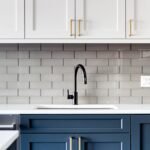
As home design trends constantly evolve, homeowners often find themselves questioning the longevity of specific interior trends. One trend that was long favored and has now come into question is the subway tile backsplash.
Renowned for its clean look, classic style, and versatility, subway tile has been a staple in both kitchen and bathroom design for many years. However, as new tile trends emerge and because of oversaturation in the market, many people are left wondering if the subway tile backsplash is outdated or if it will always hold timeless appeal in the ever-evolving world of interior design.
Are Subway Tile Backsplashes Outdated?
Subway tiles have been in use for over a century, having been introduced in 1094 to line the walls of the New York subway system due to their ease of cleaning and maintenance. The simple lines of the 3×6 glossy white tiles quickly became a favored design trend.

Subway tiles grew in popularity over the century, but they became one of the most widely used tile types in the late twentieth and early twenty-first centuries, as part of a renewed interest in classic and simple design styles. Subway tiles are now available in a variety of sizes, colors, and finishes while maintaining their classic rectangular shape.
While some interior design experts argue that subway tiles are out of date, they are still widely used by homeowners and designers alike. The very ubiquity of subway tiles has made many interior designers look for more custom options that set their style apart. Tile trends over the last few years have shifted toward more unique, handmade options such as zeillige or encaustic tiles. Even so, subway tiles have maintained a strong presence in both residential and commercial spaces.
Subway tile backsplashes remain popular due to their simplicity and adaptability. They can be adapted for a variety of kitchen styles by using different grout colors and installation patterns or by pairing them with more contemporary elements to keep their look fresh and relevant. Whether subway tile backsplashes are considered outdated depends on how they are integrated into the overall design scheme. Ultimately, the enduring nature of the subway tile backsplash suggests that it has a timeless quality, making it a safe choice for most homeowners.
Ideas to Make a Subway Tile Backsplash Look Current
Subway tile has a classic shape, so it will always retain a timeless look. Because it has been overused in kitchen backsplashes, you can reinvent the style by incorporating this classic shaped tile in new and exciting ways.
Creative Layouts

Moving away from the traditional subway tile layout and instead opting for creative patterns like herringbone, vertical stack, chevron, or diagonal installations can transform the look of the subway tile. These unconventional layouts will introduce dynamic visual interest and add a contemporary flair to your kitchen design. Choosing a unique tile pattern will make your subway tile appear more intentional and more integrally connected to the design of the kitchen, rather than just looking like the default kitchen backsplash option.
Subway tiles are incredibly versatile and can be used for a wide variety of layout arrangements, including a horizontal stack, vertical stack, herringbone, chevron, diagonal, basketweave, cross-hatch, step-ladder, and the classic running bond.
Bold Grout Colors

Using grout as a design element in combination with subway tiles offers a simple way to impact the look of the kitchen backsplash. While using grout of the same color as the tiles simplifies the visual effect, contrasting dark grout with light subway tiles and light grout with dark tiles produces a bold, graphic look.
This style works well in a variety of kitchen styles, including historic, modern, and industrial designs. This technique not only enhances the visual texture of the space, but it also allows for greater personalization and more dynamic looks using subway tiles.
Vary the Size

Subway tiles were initially designed in a 3×6 rectangular format, but due to their widespread popularity, manufacturers began producing them in a wide range of sizes. They are available in both large and small rectangular sizes. Selecting large scale subway tile sizes can make a strong visual impact. Mini subway tiles make for an intricate and detailed looking backsplash.
Color Variations

Exploring all of the iterations in colored subway tile will quickly exhaust you due to the sheer number of possibilities. Tile manufacturers have progressed far beyond producing only white subway tile to tile in bold, pastel, and rich, deep tones that reflect all of the variations in kitchen style.
The diverse color palette enables any homeowner to create a stylish and personalized backsplash. You can also combine new colors with a variety of finishes, such as matte tiles for understated sophistication or glossy options for a touch of luxury in any room.
Patterned and Textured Subway Tiles

Subway tiles with patterns and textures add a modern touch to a classic design. Unlike the traditional flat, white surface of the classic subway tile, these tiles have subtle motifs, embossed designs, or irregular surfaces, resulting in a more tactile and visually appealing backsplash.
Patterned tiles can range from delicate geometrics to intricate florals, giving your kitchen an artistic flair. Textured tiles are more understated than patterned tiles, but they still provide more depth and dimension to a backsplash than smooth subway tiles. Many designers are opting for handmade subway tiles that have a slightly irregular shape that makes them look more distinctive than machine manufactured tiles.
Mixed Materials

Mixing subway tiles with other materials and tile types can create a rich and layered backsplash design. This mix and match effect produces more texture and contrast, enhancing the overall backsplash design. For example, a stripe of glass tile or a framed section of differently shaped tiles above the stove will give your kitchen or bathroom backsplash a more distinct design style.
Gradient or Ombre Effects

To create a gradient or ombre effect with subway tile, use tiles in various shades of the same color. Depending on the color scale and tile variation you use, you can produce obvious or more subtle effects. The gradual shift in color tones will create depth and dimension in the backsplash, enhancing its aesthetic style and making it the centerpiece of the kitchen or bathroom design.
Unique Materials

Standard subway tiles are made of ceramic or porcelain, but you can get a more unique look by using subway tiles made of other materials, such as marble, slate, and recycled glass. These tiles feature natural variations and veining, resulting in a backsplash with organic texture and depth. The variety of unique materials used to make subway tiles allows homeowners to select a material that complements their individual kitchen style.
Counter to Ceiling Coverage

Even minor changes in the coverage of a backsplash can improve its appearance. Extending the coverage of the backsplash from the counter to the ceiling gives your kitchen a custom look. This streamlines the appearance of the space and improves visual continuity in the design. It also increases the size of space’s reflective surface, making it feel lighter and brighter.
How to Refresh a Basic Subway Tile Backsplash Design
A subway tile backsplash is a classic design feature, but if you have had one in your kitchen for many years, you may be ready to update the look. Even so, you may not want to install a completely new backsplash design or even undergo significant renovations to alter your existing backsplash. There are some ways that you can update the look or draw attention away from a standard subway tile backsplash.
Accent Decor

Introduce eye-catching decorative elements close to the backsplash. Hang decorative wall art, plates, or a stylish clock in the backsplash area to divert attention away from the simple tiles. Hang wall decor near the backsplash, or if you have the space, hang these items directly on the backsplash. Instead of drilling holes in the tile, use appropriately sized adhesive hooks.
Open Shelving

Installing open shelving over a subway tile backsplash can add texture and interest to your kitchen design. Even a small section of shelves above a subway tile backsplash will allow you to display a wide range of useful and decorative items, such as colorful glassware, houseplants, and small pieces of artwork.
Vibrant and Textured Accessories

Including colorful or visually appealing elements in your kitchen design can draw attention away from a simple backsplash. Consider using stacked cutting boards, baskets, colorful small appliances, strategically placed plants or cut greenery, fruit bowls, and colorful cookbooks. These accessories do more than just draw attention away from your backsplash; they also allow you to customize the look and function of your kitchen.
Credit : Source Post






